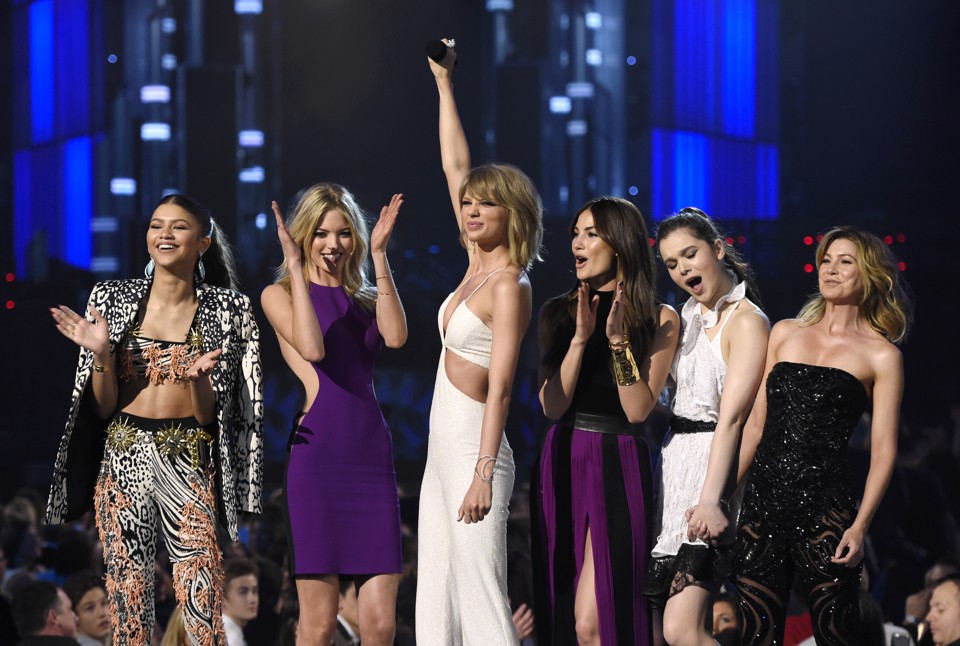
Being a Taylor Swift fan has been a strange experience over the past year. While she had completed the crossover into mainstream pop stardom in the Red album era, it’s in the current 1989 era that she has reached superstar status. Several times recently I’ve seen her described as the biggest pop star on the planet, and it seems weird, but it’s probably true.
There are many different types of artists sharing the top tier with Taylor, from the Adeles and Kanye Wests to the One Directions and Coldplays. But there is a special type of fame reserved for female pop superstars, an extra level of scrutiny and expectation, and a responsibility to their fans and their gender that they could never fulfil. When Taylor made the transition from country artist to pop star and achieved a new level of success, she automatically took on that responsibility.
Taylor’s years in the music industry and the media spotlight meant she was better prepared for superstardom than most, in the same way that Beyoncé was prepared by her time in Destiny’s Child, and both have dealt similarly well with the bizarre demands that a woman faces in this role. Taylor handled her new situation so expertly that for a while she seemed almost untouchable, but in recent months the strain has inevitably started to show.
The success of the Red era had put Taylor in a rare position where the world was waiting for her follow-up with high expectations. Even more unusual was the fact that she fulfilled those expectations, and in fact exceeded them, with 1989. It was the best work of her career, released at the perfect moment. In 2014, the stars aligned and the results were magical. From the exuberance of Shake It Off to the emotional power of Out of the Woods, and the perfect pop of Style, 1989 rightfully earned critical acclaim and commercial success. It was the biggest-selling album of the year in the US, and has so far sold over 8 million copies worldwide.

Having waffled on to anyone who would listen about Taylor’s underrated brilliance for the previous five years, I was proud to see pop fans, from the obsessive to the casual, declaring themselves Swifties and scrambling for tickets to her 2015 tour. I not only had a feeling of redemption as the potential I’d spotted in Taylor was revealed, but it was also a great experience to be able to discuss my favourite album of the year in depth with fellow pop geeks. These days I often feel out of tune with the musical zeitgeist, as my ongoing search for the next big thing leaves me listening to artists others don’t care about yet, and in some cases never will. For these reasons, I was happy to share Taylor with the world.
However, Planet Pop turns quickly, and like on Earth, night always follows the day. And, to throw in another analogy, Taylor was flying worryingly close to the sun. The press is famous for building up celebrities only to bring them down, and a few months ago I wrote about my observation that social media has given fans the power to behave in the same way. I remember in a meeting in July, speaking about being a Taylor Swift fan, I expressed my fear that her golden girl status put her next in line for a takedown. As the 1989 campaign was no longer shiny and new, her fall felt inevitable, and the wait was making me nervous.
It was less than a week later that Taylor made her biggest mistake, her misjudged response to Nicki Minaj’s VMA rant on Twitter. She resolved it as well as she could by apologising, but the damage was done – like Gary Barlow’s tax evasion and Jamelia’s fat-shaming, it wasn’t a mistake she could own. Although this was the most high profile and obvious error in the 1989 era, I saw it as a follow-up to the first mistake of the campaign, which took place in one of the earliest promotional interviews. Speaking to Rolling Stone, Taylor gave away details about the inspiration behind the song Bad Blood which made clear it was about Katy Perry.

The reason this was such a big mistake was that the broad PR campaign around 1989 has a theme of female friendship. This is similar to how the Red era had a PR theme of celebrity boyfriends, which functioned to push Taylor firmly into the tabloid world. Typically self-aware, Taylor knew when the celebrity boyfriends theme was getting tired, and the female friendship theme was the perfect antidote as she subliminally assured her (mostly female) fans that she prioritised them over any romantic relationship. Even now she’s dating Calvin Harris, that relationship is portrayed as secondary to her friendship with Karlie, Cara, Selena and the rest. However, as Katy was happy to point out, calling out a rival pop girl was a glaring contradiction and over time has undermined the theme.
The day after Taylor’s fateful tweet to Nicki, even though I had seen it coming, I watched my Twitter timeline in shock. I have never seen the tide of opinion turn so quickly and dramatically. Pop fans gleefully tore into the golden girl, seizing the opportunity to bring her back down to earth and remind her of their power. Personally, I agreed that Nicki’s point about race shouldn’t be swept aside and that Taylor handled the situation poorly, but felt the reaction to Taylor’s ill-advised but well-meaning tweets was overblown. Members of the fan community who were unhappy with Taylor’s rise to superstardom used her mistake as an excuse to try and right this apparent wrong. Taylor, at the height of her career, was too secure to be dethroned, but the keyboard warriors did succeed in proving that no celebrity, not even Taylor Swift, is untouchable.
I didn’t comment on the drama between Taylor and Nicki at the time, because yet again I was feeling out of tune with the zeitgeist. But now, looking back, the whole situation has made me realise that I judge artists differently to most people. I think one of the driving forces behind the backlash towards Taylor is a dislike of her manipulative nature, which became apparent to many of her new fans for the first time in recent months. The increased press attention has highlighted something she doesn’t want us to see, but depends upon to stay at the top. Taylor has certain tricks she brings out time and time again to assert a chosen perception of herself. The first example that became well known was the “surprised face,” an exaggerated response to fan adoration that unsubtly proclaimed her humility. She regularly uses the social media strategy of “surprise and delight” to show she cares about her fans. Now she has the ever-growing “squad” and the self-empowerment speech during the 1989 tour to show she supports other women.

At surface level a manipulative nature seems like a good reason not to like a pop star, but it doesn’t hold up to analysis. If you’re a pop star, being manipulative is smart. Business, PR and marketing are all about manipulation, and the more effectively you do it, the more successful you will be. To criticise a pop star for being manipulative is like criticising an academic for doing research for their paper, or a builder for getting the right materials to complete their job. To tell a pop star not to be manipulative is to ask them to stop trying to be successful. It’s an inherent part of the job, and Taylor’s expert manipulation is what put her ahead of every other talented, pretty young girl who wanted to achieve what she has.
Not only do I believe that manipulative qualities are unfair grounds for criticism, but I would say that they are among the main reasons (aside from my love of her music) I support Taylor over other artists. Although I don’t really believe it, the idea that she might be an evil genius masquerading as the nicest person is pop is quite appealing! I don’t care if pop stars are genuinely nice (as anyone who did Nietzsche for A Level philosophy knows, there are no selfless acts anyway!), but it thrills me to see them convincing the world that they are. I was obsessed with Jennifer Lopez’s reinvention of herself as a sweet, down-to-earth girl on American Idol for the same reason.
The artists I have the most admiration for are the ones who control their public image masterfully, and Taylor does a fantastic job, especially considering the level of attention she receives. She destroys the preconceptions that as a young female pop artist she wouldn’t be business-savvy. Anyone can employ a good PR, but only a highly intelligent artist obsessively in control of her own career could play the media game so well. As a girl working in the music industry, particularly with female artists, I find it very inspiring.

Taylor is at a tricky point right now, as her career needs the refresh that the move into a new album cycle would bring, but she still has more than three months of her world tour left to complete. Although the special guest duets and “please welcome to the stage” celebrity appearances are getting a lot of press attention, and undoubtedly helping to sell tickets and music, it’s making the 1989 era feel like it’s dragging on, only 10 months after the album release. All artists do the same thing on their tour every night, but with such intense scrutiny, Taylor is starting to seem like a parody of herself. Even I feel like I’ve seen enough of her lately not to need to watch the VMAs, where she won four awards, duetted with Nicki Minaj (of course) and was apparently mentioned with reverence throughout.
For the next few months, I hope Taylor will use that old self-awareness to keep her head down and finish the tour without incident. As for what the future holds, I have many ideas about where she could go, which I plan to write about soon. Whatever she does, she’s written herself into the pop history books, and with all her talent in music, business and PR, her place couldn’t be more deserved.
Edited to add: I wrote this piece before hearing about the latest Taylor Swift controversy, the accusations of romanticising colonialism in her new video for Wildest Dreams. It’s certainly a head-in-hands moment considering the racism she has already been accused of this year, but this post is long enough, so I’ll pass you over to The Guardian, who have published a good article about this which interestingly echoes some of the points I made above.
0 comments